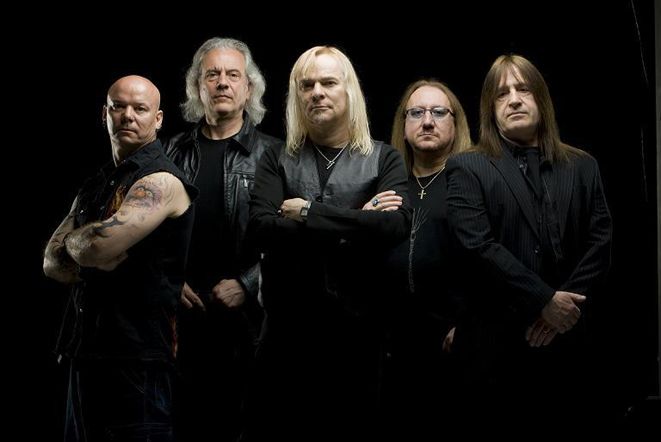|
Uriah Heep debut album, Very 'Eavy... Very 'Umble (Uriah Heep US), introduced a heavy organ and guitar-driven sound,
with David Byron's theatrical, dynamic vocals soaring above thunderous sonic backgrounds, although acoustic and jazz
elements also featured in the mix. The album's title references the signature phrase of the Dickens character Uriah Heep
("very 'umble") from the novel David Copperfield from which the band took its name.
Second album, Salisbury, was more squarely in the progressive rock genre, with its 16-minute title track
featuring a 24-piece orchestra. The third album, Look at Yourself, released at the end of 1971,
included the song "July Morning".
On December 8, 1975, New Zealand-born former bassist, Gary Thain, was found dead in his Norwood Green home, aged 27,
having overdosed on heroin.
Following the 1976 replacement of vocalist David Byron (with John Lawton - formerly of bands Lucifer's Friend and
The Les Humphries Singers), Uriah Heep turned away from fantasy-oriented lyrics and multi-part compositions
back toward a more straightforward hard rock sound typical of the era.
In 1977 they scored a top 40 chart hit in Australia with "Free Me" which went all the way to #1 in New Zealand.
The replacement of Lawton with vocalist John Sloman for the 1980 album Conquest was not well received by most fans
and Ken Hensley's acrimonious departure in September of that year left the group in a state of collapse.
It fell to guitarist Mick Box to pick up the pieces and soldier on with a new singer Pete Goalby of Trapeze fame.
Two early 1980s releases, Abominog and Head First, updated the band's sound and generated a brief, newfound interest
in Uriah Heep among younger heavy metal fans.
David Byron died of liver disease on February 28, 1985, at the age of 38.
Uriah Heep continued to tour and release studio and live albums.
The lineup was unchanged from 1986 until early 2007, being veteran Mick Box at the helm, Trevor Bolder on bass,
Lee Kerslake on Drums, vocalist Bernie Shaw and Phil Lanzon on keyboards.
Their principal tour circuit is in Germany,
the Netherlands, the Scandinavian Peninsula, Japan, and Russia, although they returned to Britain for a tour or a
showcase concert most years. For several years this was The Magician's Birthday Party (named for one of their most popular albums),
in London. Mick Box also acted as manager until, on April 5, 2005, the band retained Simon Porter as their manager.
In early 2007 Drummer Lee Kerslake had to leave the group due to ill health.
In March 2007, the band recruited Russell Gilbrook as their new Drumsmer, and immediately started recording
a new studio album entitled Wake the Sleeper.
Originally slated for a Summer 2007 release, Universal Music finally released Wake the Sleeper on June 2, 2008. |


